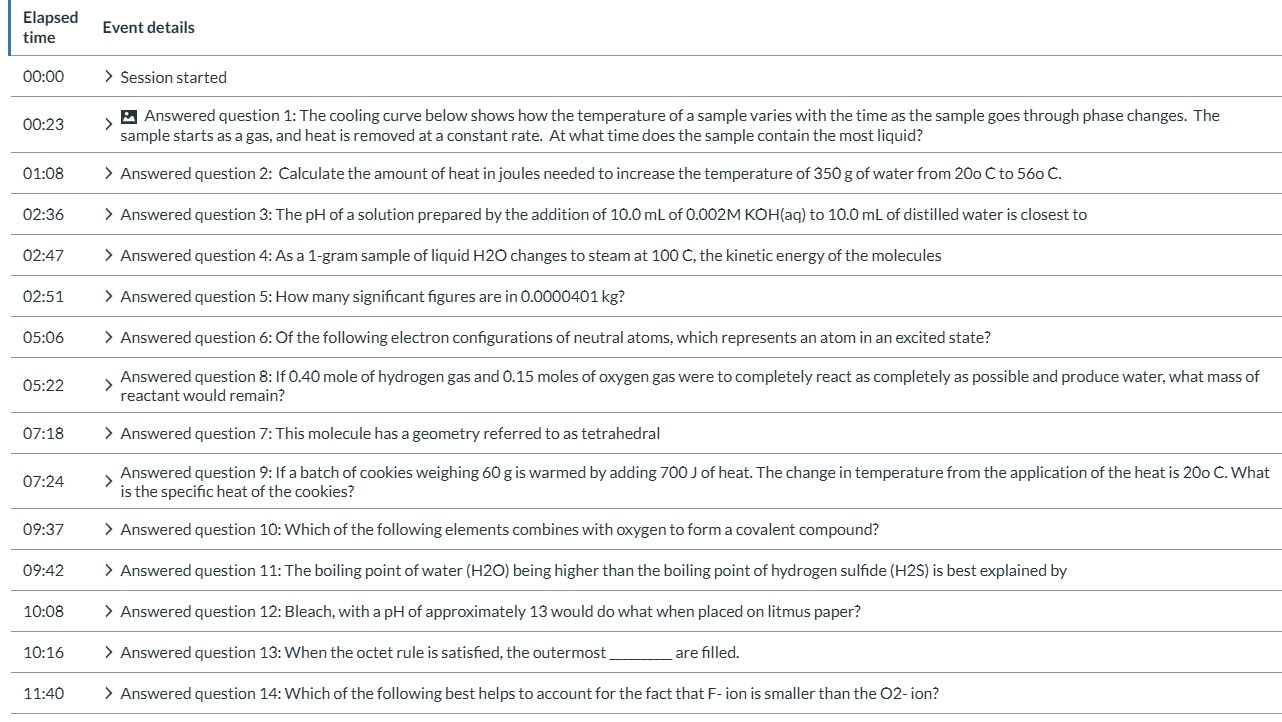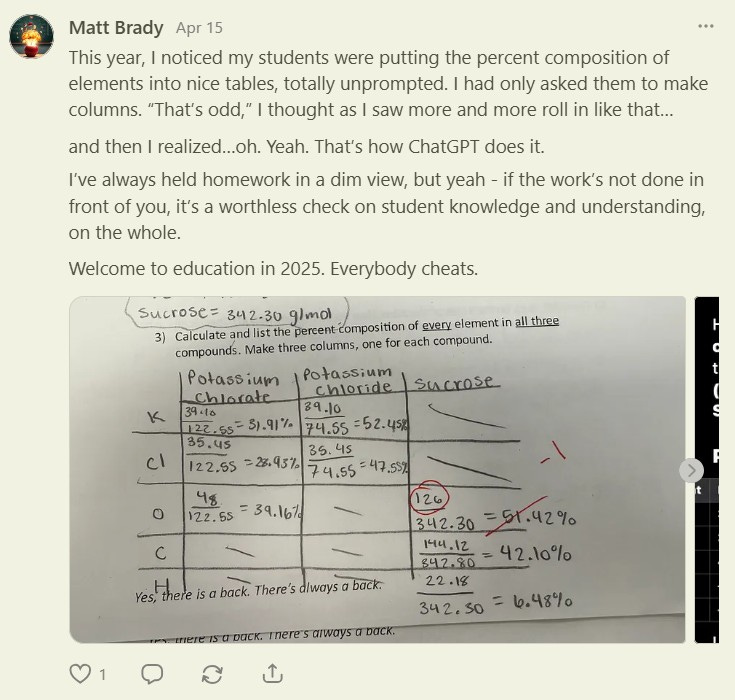Sometimes, when I read glorious, rainbow-filled stories about the integration of AI into education, I feel like Kate McKinnon below.

Nah — my experience with AI in schools is more in line with the Wall Street Journal article from late May:
The WSJ article led to a flurry of other articles. I particularly appreciated Gizmodo’s, “AI Cheating Is So Out of Hand In America’s Schools That the Blue Books Are Coming Back,” in which, Giz referenced its earlier article, “It’s Breathtaking How Fast AI Is Screwing Up the Education System.” Other high points were WSJ’s opinion from earlier in May, “How to Stop Students From Cheating With AI: Eliminate online classes, ban screens, and restore Socratic discussion as education’s guiding model,” and I also loved the preciousness of MIT’s Sloan School, “AI Detectors Don’t Work. Here’s What to Do Instead.”
We’re in the Knee-Jerk Era.
Acolytes of AI will fuss and counter, but AI is currently undermining the education system as we know it on all fronts: secondary, private, higher, and professional education. It’s time not for more mealy-mouthed guidelines about the use of AI in the classroom, but rather for a larger review of what education should mean for our kids.
Allow everything that follows to serve as a cautionary tale of a control group. What happens when AI worms into classrooms before students are familiar with the ethics of using AI, its benefits, and its drawbacks1? In short, no AI literacy.
This is the road to Idiocracy, and it’s smooth and you can slide all the way down without feeling a thing.
To explain where I’m at, as of now, after the end of the 2024-2025 school year, neither the school nor the district has a school- or district-wide AI policy or guidance in place. It has not been integrated wholesale into our curriculum, and content section leaders do not discuss it2.
Additionally, ChatGPT, along with many other AI apps and sites, are blocked from the school networks (although some are not - you’ll see that later). Individual teachers (like me) have taken baby steps with it. Still, given the lack of guidance and the “at-will” nature of our employment, use of AI in classrooms may be viewed as a positive by one person and a fireable offense by another3.
ChatGPT was released on November 30, 2022.
We’ve been asked for feedback on drafts of a guidance document for AI use in classrooms two times this spring. Of 2025. Our state’s Department of Public Instruction released its guidelines a year and a half ago (January of 2024).
We’re long overdue for a comprehensive, acceptable use framework for AI, along with ethical use and literacy. Not to mention a robust system to identify and prevent wholesale, AI-assisted cheating.
This Might Sting…
The soft stuff that we all agree on first…
Due to the pressures we (schools, teachers, counselors, parents, and society) put on students to achieve the highest grade possible, the end result for most students is their GPA. Not the learning, not the understanding, not the broadening of horizons, not to make them a whole person, or any other talk that a professional development presenter might say.
We do — that’s on us. Grades are the be-all, end-all—the point of school. Every message in schools, spoken or unspoken, is connected to the idea that a high GPA is everything. Everything.
As a teacher, I constantly see both parents and students demonstrating this. It can take the form of something as gross as kids who only want to be in a club if it will give them something they can put on a college application, to the Mercenary Class, a.k.a. AP students.
The point is, the education system is part mostly a machine that only looks at students with high grades as successful, and they cannot get off this ride. Again, it’s on us — parents, teachers, students, society. We perpetuate this belief that the point of any class, of your school career, is to get the highest grade you can. Everything else (critical thinking, being a good citizen, being well-rounded, etc.) is, at best, secondary.
That’s not the controversial part, just facts
I hope it softens these punches to the face:
If you have a kid in the education system, they are using AI to cheat.
If you are a teacher, your students are using AI to cheat.
If you oversee a school or a district, part of your glorious success and growth over the past couple of years is due to students using AI to cheat.
In this end-justifies-the-means society we live in, I don’t think this is anything new or even startling4. I know, I know — students have always cheated. But not this much, not this pervasively, and not in these numbers. And it’s happening for two reasons in high school: it’s easy, and everyone else is doing it.
Let me show you what I mean.
This is Breathtakingly Easy
Like many other districts, mine uses Canvas as our learning management system (LMS). We busted it out for the pandemic, damned the torpedoes and went full speed ahead. So I’m going to beat up on Canvas for a minute. Your district may use another LMS, but I expect the story is similar.
Canvas was cool, for about a minute. Until we realized that students could cheat with ease on it5. Some of us caught on quickly, and Canvas does offer options to help with online quizzes, such as shuffling the questions and the order of multiple-choice answers. The ease of giving (and grading) a multiple-choice test on Canvas was such a time saver that a lot of us overlooked the simplest checks (more below), thankful that we had clawed back some time.
And honestly, Canvas knew there was a potential problem and wasn’t exactly helpful at fixing it. This is what I mean:
This is a log from a student’s test:
See that up there are 24:49 and 24:50? “Stopped viewing the quiz-taking page” and “Resumed?”
Canvas operates in a browser, and (in theory) logs every time the browser’s focus moves from the quiz tab to anywhere else. For a time, we wanted to call that cheating (a student could alt-tab to another app or browser, check for answers online, etc.) and rain down hellfire. Still, both Canvas and Colleges and Universities that used Canvas pulled things back, implying that the log alone wasn’t enough evidence to say the student was cheating.
There are four common browsers that students can use to complete assignments in Canvas. It can run on a school-issued Chromebook or a personal computer, which could be configured in any of a million different ways and have a million other apps running in the background that could innocently steal the browser’s focus. Students could also have a ton of tabs open, and something on one of those tabs might steal the browser’s attention.
So yeah, the notification itself wasn’t a hill you wanted to die on with a hearty, “j’accuse!’ Kids learned this. And were emboldened, armed with a litany of reasons why things might have looked the way they looked.
In those early days, (if they even checked) teachers figured a possible cheat here or there on a test would average itself out, and it often did. However, with the advent of easy access to AI, this took on a different form.
Holy shit. It took off like wildfire.
Sometimes I Get Lucky
Okay, total teacher talk here. I had a kid take a test, and they scored higher than they should have6. It was toward the end of the year, and I was tired and grumpy, honestly chafing at the idea that kids were getting away with cheating on Canvas. I checked the log, and yeah — a lot of the exit/resume stuff. So I found the student and gave a hearty, “j’accuse!”
It was a risk. “Yeah, my messenger kept opening,” or “I don’t know why it did that,” or “Another tab just popped up — I don’t know why,” were all excuses that we had become familiar with, and were honestly tired of fighting with students about. Again, accusing a student of cheating is a pretty unwalkable-back thing. Again, we have a weaksauce shred of evidence, and they have a litany of non-falsifiable excuses7.
Some specifics: there was a case at Dartmouth in 2021 where the school accused 17 students of cheating on a Canvas test, based on the “stopped viewing/resumed” in logs, but no actual evidence of where these students went when they “stopped viewing.” The school lost8. Canvas even advised teachers not to use the “stopped/resumed” as the only piece of evidence for punishments.
But — quelle surprise! When I said that the student had inconsistencies in their log, they admitted it. Quicker than I thought. I’ve watched waaaay too much Law & Order, so I gave him a way to plea this thing out - do nothing and eat the zero (which would put them back in the class next year), or show me how they did it, and squeak by, grade-wise the the lowest D known to mankind.
They said they would come by my room the next day and show me.
I had my phone ready to film it, and a pad nearby to take notes when they came into my room. In the end, I felt stupid for that much preparation. It took them 60 seconds, and they ended with, “Can I go now?”9
Here we go — AI cheating on a Canvas test:
Yeah — there’s no way to lock other browsers out of Canvas, and this was the most straightforward approach to it. Each time the side window popped open with the answer in it, the browser’s attention was stolen (aka, “stopped viewing the quiz-taking page”), and then, when the answer was clicked on, “resumed.” I am old and slow, but I’d imagine that 5 seconds is more than enough time for a student to spot the answer in the side window and click back to the question.
But Everyone Else is Doing It
So I went checking logs for earlier quizzes and tests.
Even on the free-response questions (FRQs). It was speckled throughout the entire semester. Again, there are some legitimate reasons why “stopped/resumed” would appear in the log, but it was present everywhere.
The only places I didn’t see it? After my discovery and interaction with the student above, I explicitly instructed my later test-takers to have only one tab open for the test, and I explained to them that I was aware of how it was done and the evidence it leaves behind. Every one of those students’ logs looked like this:
And I was actually looking for it. Some colleagues I spoke with looked at me when I mentioned the Canvas log like I was talking about a log made of literal fucking canvas10.
It’s Not Just This, It’s Not Just Me
This wasn’t a discovery as much as it was a confirmation.
This isn’t just me, David v. Goliathing against Canvas. It’s not just a Canvas problem. There are loads of apps that scan worksheets and give the correct answers, ones that can show you all the work for complex math or science problems, “humanizers” that can turn AI-speak into human-sounding stuff, and any other type you can imagine.
I did my run teaching writing for a quarter last year, filling in on AP Language and Composition. Some writing shone through so beautifully, it was clearly human-written. Much of it, though, had that plastic wrapper on it. Students using words that no 11th grader uses11, or bringing in concepts that they don’t have the life skills12 to incorporate into their The Great Gatsby13 essay. Assigning writing, unless it is done in the teacher’s presence, with ink or pencil on paper, is essentially asking to see how well AI models can imitate teenagers.
And any homework you give is AI-assisted (at best). Case in point:

I mean, in the above example, they weren’t wrong, and I gave them full credit, but still — did they learn how to do it, so when a similar problem showed up on the test, they would be able to reason their way through it and come up with an answer?
No.
Have homework that you want students to practice skills on, and they may fire up their ChatBox.ai app14, which will scan the page or problem and deliver answers in seconds. We can’t check for them all, and just when we think we have a solution for one, there are a dozen more, for Canvas, worksheets, writing, name it.
Homework is taking on a homogeneous sheen.
Come At Me, Bro
Viewed through a particular lens, this is all my fault15.
I get you:
Have you contacted Canvas about the vulnerability?
They know there’s an issue, and already warn not to use the “stopped viewing/resumed” as your only evidence.
Have you contacted Microsoft?
Why in the world would they care about how Edge works in schools? They’re in a war with Google, OpenAI, Anthropic, X, Meta, and anyone else who has a nascent AI out there to be the industry leader.
Have you contacted your district IT department?
I’ve been asking for a browser lock or secure mode for nearly a decade now for our various LMSs, and according to them, such features don’t, haven’t, and never will exist16. I stopped asking.
Can’t you step it up and make sure they don’t cheat during Canvas tests?
Yes, I could work to ensure that Canvas tests were clean (and I had some luck, but that was with a small audience) by having students demonstrate that all tabs are closed, no other programs are running, and that they are using Chrome as their browser. Then I could prowl the aisles of my room during the test like a perpetually angry teacher who knows, knows someone is cheating.
Yeah, that’s why I got into teaching.
Can’t you make your assignments AI-proof?
By and large, I think (thought) they are (were).
And there’s a frustration here with teachers — the long-story promise of technology is that it will make our lives easier17 and stress-free.
And yes, to a degree, a lot of this is circumstantial. But any teacher who has been in the job for a while has a feel for what’s going on:
As is my jam, I can’t entirely blame the kids —they’re going to be kids. The easy way out is right here…will you take it, or will you do the “right” thing that carries its own intrinsic reward, the one with delayed gratification?18
And I’ll back off of my earlier mean stuff — your student, the students in your room, might not be using AI to cheat on tests while taking them. But at some point soon, they’re going to be tempted. And they’ll be assured that it’s easy, and the teacher never spots it.
We’re Not Going to Win This War
True Story 1 — In the (rare) times when AI is talked about with teachers, inevitably the discussion moves to “It can write your lesson plans for you!”19 The between-the-lines-ing there is that writing lesson plans is drudgery, and therefore, just hand it off to AI. At a workshop, beginning teachers (BTs)20 cheered when Digital Coaches were asked to help them get AI to write their lesson plans.
Two things — these were adults wanting to, and being told to offload boring stuff, or stuff they didn’t know how to do to AI, and then use it as their own.
Just let that marinate for a minute or two.
True Story 2 — In the coming year, because of Google’s new age-restriction stuff, students will not be able to access YouTube on the school’s public network, the one they have access to21.
I incorporate a lot of pop culture references and video clips, not to mention links to videos I want them to view and respond to, or those that are there for further help or deeper dives into the topics. Yeah - those are gone. Can’t do that in school22 anymore.
Blocking YouTube is a perfect example of why we won’t win this war to keep kids off of AI. On my first day of the year, I was already thinking of offering extra credit for solutions to access YouTube using the school’s Wi-Fi23. I figure it would take them about two minutes, tops24.
The kids will be solving the problem in parallel, all of them, trying to find a workaround, create a hack, exploit a vulnerability, all at once, and those solutions will constantly evolve. IT cannot stop all of them.

IT is acting in series. Identifying a problem, blocking, and then blocking again. And again. IT (read, adults) cannot win.
The adults are keeping the kids from something (AI) that would make it easier for them to reach the place where the adults want them to be (good grades). On a certain level, this makes no sense to the kids and convinces them that adults are dumb.
I tend to side with the kids on this one.
And that’s the thing — getting kids to identify a problem, and work in parallel is like, one of the best outcomes I could hope for as a teacher. It showcases a diversity of thought and approach. Hell, it demonstrates why collaboration and diversity is good in the classroom, which can be applied to society as a whole25.
So we’re in a fight — kids are going to be kids, and kids will use AI to cheat, to find the easiest way to do things. That is what should be expected.
But we can’t approach this problem the same way we approach issues in education, and expect it to work. This isn’t a “more rules” situation26. This is not something where we can keep everything else the same, but appeal to the intrinsic reward of education, and then punish students for being…students. Who are just trying to do what we’ve told them to do.27
Everything has to change.
Thanks for reading — I’m going to follow up on this next time.
As I do, there of course are going to be oblique references to my district (below average in a woefully below average state that, politically, does not value public education, and hasn’t for over a quarter of a century. I point out these things with the full knowledge that I work in an at-will state, meaning that I can be fired, demoted, or given demeaning jobs to do at any time for any number of infractions, real, interpreted, or wholly imagined by people above me. Got it? Cool.
As always (and YMMV, personnel committee), I use my school and my district as examples of average to below-average schools and districts across the country. True, most distracts and states do better than us, so I may be hopelessly siloed in a container of mediocrity so deep that I can’t see outside, but, falling back on some statistics and probability, I think we’re average. I’d bet there are more schools and districts like us than not like us. Don’t fire me, okay?
No, seriously. I may be seen as helping to drag my students into the future by an admin, evil for using a blocked technology by another, and (since an app I suggest they use may be blocked at school), anti-equity, since not all students have good internet at home (or in the coming years Chromebooks, as our district contract runs down, and we don’t have the cash to replace them), so they cannot do the assignment. Working at an at-will state, unless you are a drone, doing drone-level work, is basically playing lots of games of Russian roulette with your career.
Although I’m sure some parents reading this are sputtering at me about how their child would never! I’ve met your child when you’re not around. Yeah, they would, maybe not with me, but for other teachers. And I know there are parents out there who feel a sense of pride that their kid did cheat with AI and didn’t get caught, because the end justifies the means.
Or, blend Canvas with unfettered phone access, and you are in for world of cheating, especially when you blend in noob teachers who don’t know Canvas’ bells and whistles (or thinks kids won’t cheat).
Yeah, we can tell. Students are remarkably consistent with their work, whether it’s terrific, meh, or lousy. We’re thrilled to see they break from their usual and move in a positive direction, but more often than not, they settle into their groove, and their grades stay in it.
Unless I want to go all forensic IT on their laptop, and then…perhaps find that they weren’t lying. However unlikely that outcome was, you would rarely walk down that road.
Despite this, there are videos of instructors almost gleefully showing how, by just using the logs, they “caught” and punished a student for cheating. Are some of the “stopped viewing/resumed” innocent? Probably. Are all of them? Probably not. Can you punish all students with a “stopped viewing/resumed?” Some do, and sleep like babies at night.
That was a shitty deal that I gave them, and I would make a shitty ADA in Law & Order.
Averages, man — averages. Not everyone’s a winner.
Because they forgot to use the “humanizer” AI model. Rookie mistake.
It’s not the years, it’s the mileage.
Yes, they still read The Great Gatsby, and I will die on this hill. I mean, Jesus Christ, we’re living through it right now again, aren’t we? I mean: “They were careless people, Tom and Daisy- they smashed up things and creatures and then retreated back into their money or their vast carelessness or whatever it was that kept them together, and let other people clean up the mess they had made.” That’s Tom and Daisy Buchanan, elitist, entitled, and unable to see or understand the words thanks to the blinders made of jillion-dollar bills.
“Wait - you’re telling them how to cheat!” I’m sorry — I was not aware that the internet was broken.
I do not possess one of those lenses.
“Mother will feel like a fairy princess in the kitchen of tomorrow” and all of that bullshit.
“Teacher will feel like a fairy princess in the classroom of tomorrow!”
Which can also stand for “baby teachers,” which is like 100x better as a descriptor.
Yes, I am the teacher who reads the emails from IT, also, …fuck, man. “First, they came for YouTube,” I guess.
Yes, I know, students with their own devices, or those who’ve hot-spotted into their phones (that are up in racks, or otherwise not out and certainly not being used) will have access, and they can always view the videos at home, right? Some yes, but some, without solid internet at home or a school-issued Chromebook (we’re running out), cannot. Now, this is an equity issue.
I know, I know — at-will state, and asking kids to break rules feels like something I could be fired for, and I have gotten attached to my roof and warm food.
Do you know how many unblockers are out there? I do. It’s a shitton.
I may be writing my next installment, between torture sessions, from lovely El Salvador.
It’s our favorite go-to in education. “Kids are doing this? Who gives a shit as to why, just make more rules so they can’t!” See also, “Every Problem is a Nail, and All I Got is This Hammer,” problem-solving approach.
I don’t have a psychology degree, nor the time to get into the whole idea of how kids can see example after example about how you can lie, cheat and steal and still (despite everything the adults in school said) make it to the top of the stack, and throw yourself a big parade on your birthday — with tanks and seriously unenthusiastic soldiers.













Hi Rose!
I conduct most of my tests on paper, including multiple-choice questions and short-answer questions. And this year, I'll be giving entirely paper-based tests. You're right, anything on Canvas is ridiculous at this point, even written assignments. At this point, I'd rather they receive an answer from ChatGPT and then have to transcribe it by hand and submit it than simply cut and paste.
I had been moving away from online assignments (I'll be talking about my Explainers soon...) and was pretty satisfied with where I was, but as I said, the final was at the end of the year, exhaustion had set in, and judgment went AWOL. I think a large part of this was the lie we were sold about how wonderful Canvas would be for online learning, how overworked we get, and how doing things online streamlined a lot of our work for us.
My concern is that trying to convince a school full of teachers this coming year that they need to get off Canvas will not endear me to any of them. And I love your comment about "too European!" - we should do a side-by-side comparison of systems, assignments, etc. It would be like the videos of Europeans eating American foods... :)
Is that with lockdown browser on Canvas, or is it just as easy to get around that?